#Smart GenAI For Aviation Industry
Check out Demo
Generative AI Powered Smart Bot Solution for Aviation Industry
Omni-Channel Bots – Deploy on Chat, Voice, Email, Instagram, Facebook, WhatsApp and Even SMSCheck out Demo
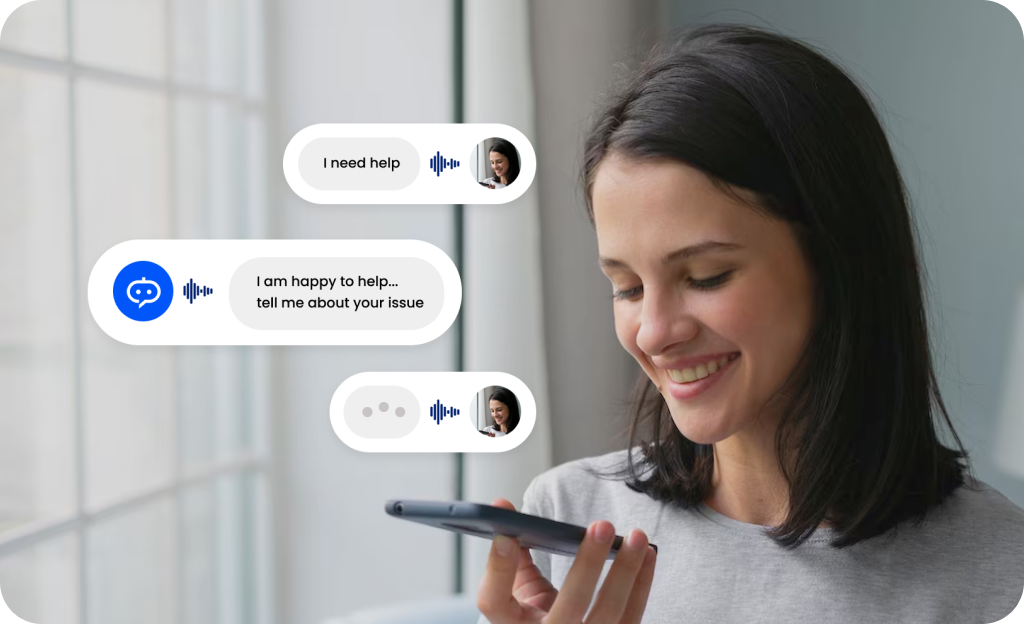
Trusted by hundreds of leading companies
























×
Check out the Enterprise Grade Bots Powered by Gen AI. No Setup Fees.
Revolutionizing Conversational AI: The Ground-breaking Impact of ChatGPT on the Future of Human-Machine Interaction
Revolutionizing Conversational AI: The Ground-breaking Impact of ChatGPT on the Future of Human-Machine Interaction Artificial Intelligence technology has come a long way, but Open AI’s ChatGPT models are truly revolutionary. These models are designed to understand natural text, enabling machines to communicate with humans in a more efficient and effective manner than ever before. One of ChatGPT’s strengths is its versatility, which means it can be used in numerous ways to streamline processes, provide personalized customer experiences, and offer valuable insights into consumer behaviour. With ChatGPT, businesses can automate tasks like customer service and improve communication with consumers, resulting in cost savings and higher productivity levels. The future of AI technology is bright, and ChatGPT is leading the way forward.
Taking Flight into the Future: How ChatGPT/GPT-Technologies are Revolutionizing the Aviation Industry
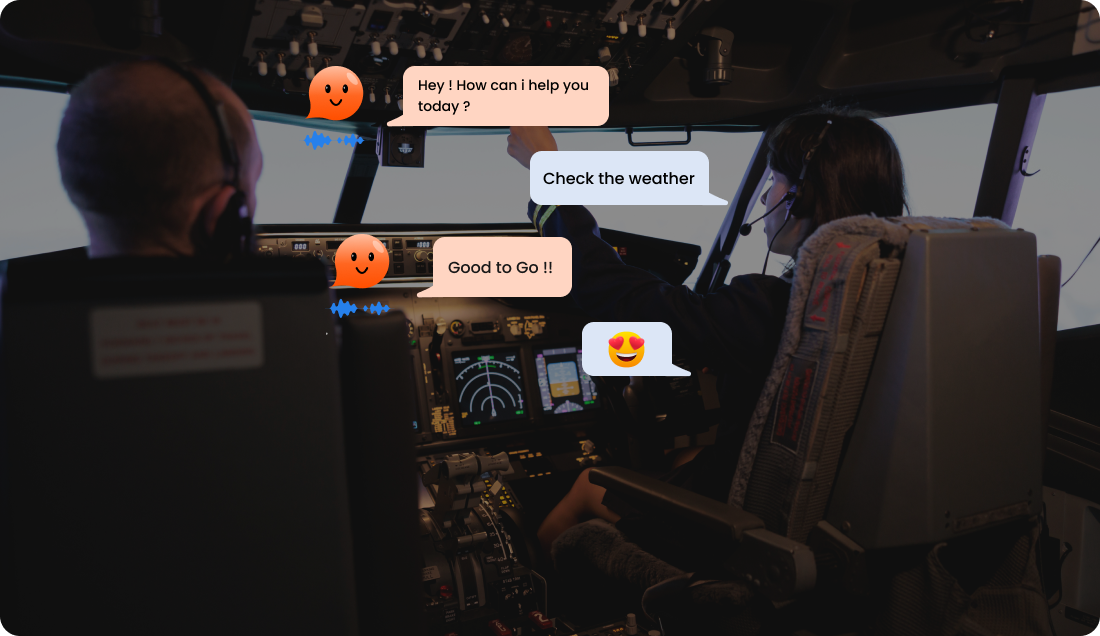
With the rise of new technology, the aviation industry is experiencing a revolution unlike any other. Leading the charge are the ChatGPT/GPT-Technologies. These technologies have been designed to assist pilots, air traffic controllers, ground crew, and even passengers to help the industry operate more efficiently and ultimately make flying safer. The introduction of these tools has enabled aviation professionals to make faster, more informed decisions and communicate more efficiently with each other. The ChatGPT/GPT-Technologies have also made it possible to gather and analyze data, providing valuable insights for future improvements in flight operations. With these advancements, the aviation industry is taking flight into the future with even more improvements yet to come.
From Takeoff to Landing: The Sky-high Impact of ChatGPT/GPT-Technologies on the Aviation Industry’s Transformation
Let us discover the top 10 use cases that prove the powerful ROI of ChatGPT-powered chatbots
1. Customer Service chatbots
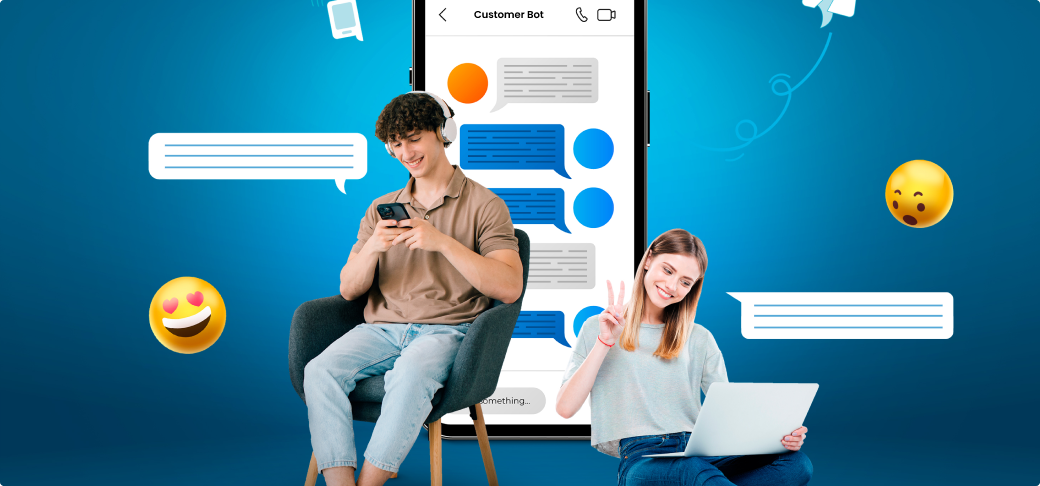
Thanks to its extensive textual training, ChatGPT can grasp the nuanced nature of consumer questions posed via the Factual Answering feature of the platform, one of the chatbot use cases in Aviation. What this means for users is that their questions can be answered correctly regardless of the language they are written in or how they are expressed.
Using the customer’s previous interactions with the chatbot as input, ChatGPT in aviation can generate unique responses. This can enhance the chatbot’s effectiveness and lead to a more interesting and rewarding experience for the customer.
Further, customers in the aviation business, who may be flying from all over the world, can benefit greatly from ChatGPT’s multilingual support staff. It has the potential to lower linguistic barriers and boost customer satisfaction.
Using the customer’s previous interactions with the chatbot as input, ChatGPT in aviation can generate unique responses. This can enhance the chatbot’s effectiveness and lead to a more interesting and rewarding experience for the customer.
Further, customers in the aviation business, who may be flying from all over the world, can benefit greatly from ChatGPT’s multilingual support staff. It has the potential to lower linguistic barriers and boost customer satisfaction.
2. Flight Planning
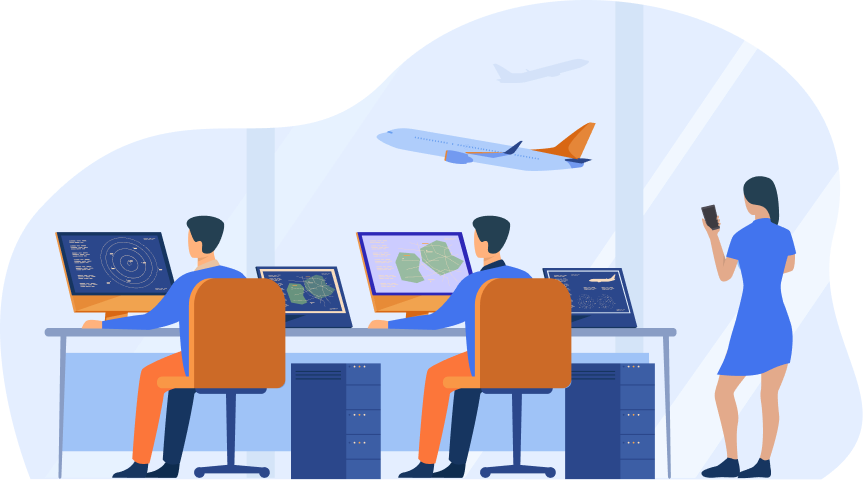
Another ChatGPT usecase in Aviation is real-time weather updates using the ability to connect to various Backends and fetch company/airline data, enabling airlines and pilots to modify their flight plans as necessary. This can lessen the chance of weather-related cancellations or delays. Airlines and pilots can select the most effective flight paths using real-time traffic information from ChatGPT-like Bots. This can lower fuel expenses and increase the effectiveness of flight planning. Furthermore, ChatGPT-like Bots can be trained on enormous volumes of data, both structured as well as UNSTRUCTURED such as PDFs, Documents, PowerPoints, and more, enabling such Bots to deliver precise and pertinent data for flight planning.
GPT powered Bots can also be linked with other systems, such as flight management and air traffic control systems, to give a complete perspective of flight planning data. This could aid in increasing the precision and effectiveness of flight planning procedures.
GPT powered Bots can also be linked with other systems, such as flight management and air traffic control systems, to give a complete perspective of flight planning data. This could aid in increasing the precision and effectiveness of flight planning procedures.
3. Flight Update Notifications
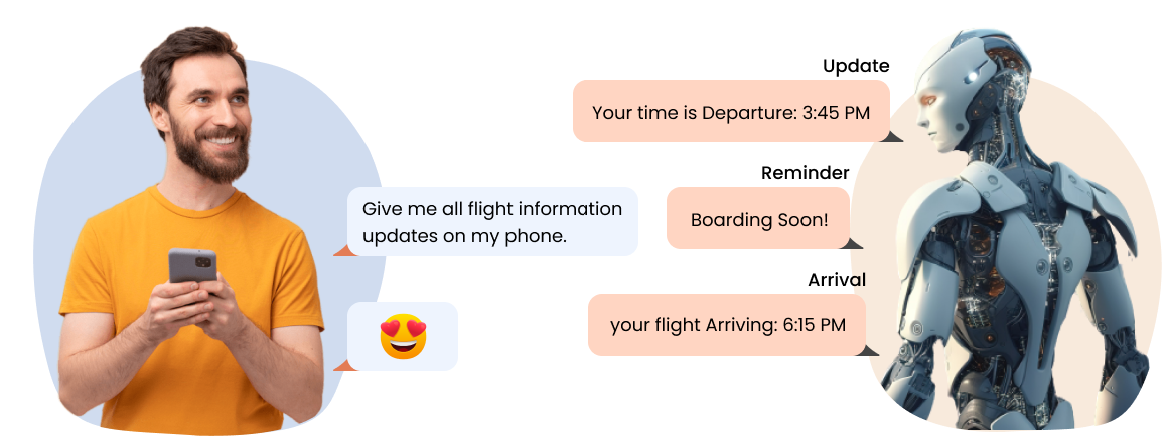
Notification updates on flight status, including information on delays, cancellations, and gate changes, are some available use cases of chatbots in Aviation. This can lessen the possibility of confusion or missed flights and keep people informed.
Using features like Anomaly Detection, ChatGPT can automatically notify passengers about the changes via various channels, including SMS, email, or messaging apps. This could increase the effectiveness of notifications and lighten the workload of airline employees.
Based on the passenger’s preferences and previous interactions with the airline, the GPT Platform, with the help of features like Text Completion and Text Insertion, can tailor notifications in human-like language and tone. This can enhance client satisfaction as well as lessen the possibility of missed alerts.
Using features like Anomaly Detection, ChatGPT can automatically notify passengers about the changes via various channels, including SMS, email, or messaging apps. This could increase the effectiveness of notifications and lighten the workload of airline employees.
Based on the passenger’s preferences and previous interactions with the airline, the GPT Platform, with the help of features like Text Completion and Text Insertion, can tailor notifications in human-like language and tone. This can enhance client satisfaction as well as lessen the possibility of missed alerts.
4. Air Traffic Control
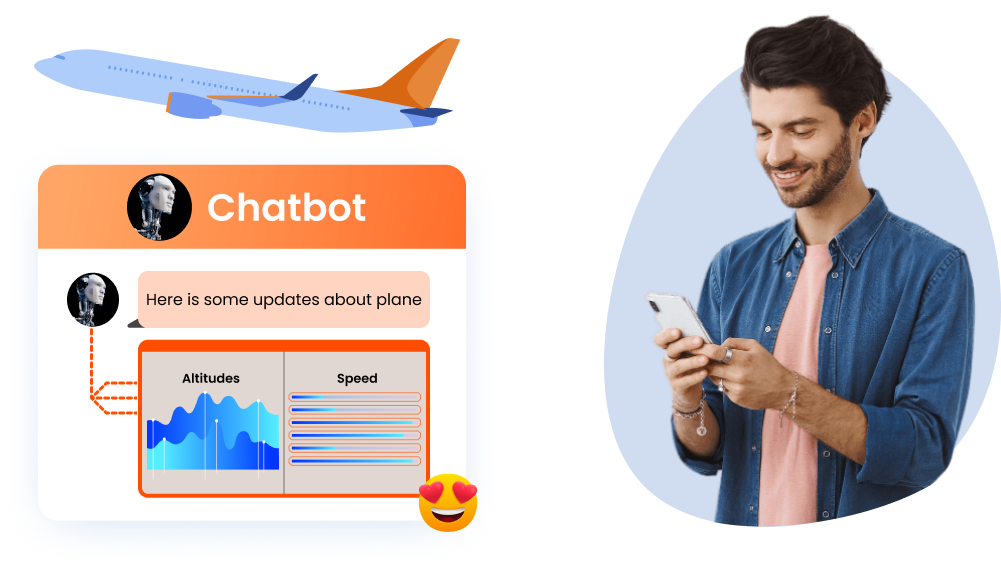
Aviation chatbots using the GPT technology can leverage platform features such as Search, Classification, and more to examine flight data, including aircraft position, speed, and altitude, to detect possible problems or conflicts. As a result, air traffic control operations can be safer overall, and air traffic controllers can make better decisions.
ChatGPT for Aviation solutions can also use the Clustering feature of the GPT Platform to examine historical flight data to forecast traffic patterns and probable problems. This can assist air traffic controllers in managing traffic flow proactively and reduce delays or mishaps.
ChatGPT for Aviation solutions can also use the Clustering feature of the GPT Platform to examine historical flight data to forecast traffic patterns and probable problems. This can assist air traffic controllers in managing traffic flow proactively and reduce delays or mishaps.
5. Maintenance and Repair

ChatGPT Bots can diagnose maintenance problems using Deep Learning algorithms, Predictive Analytics, and more such technology features and suggest potential fixes, reducing the time and expense involved in maintenance and repair. ChatGPT technology can also be used to evaluate maintenance data and forecast probable problems or breakdowns. This can assist airlines in preemptively planning maintenance and preventing unplanned downtime.
Moreover, ChatGPT platform features such as Summarization, and Search can store and retrieve knowledge about upkeep and repair, such as maintenance guides, instructional materials, and best practices. This can assist in ensuring that maintenance and repair methods are reliable and efficient.
Moreover, ChatGPT platform features such as Summarization, and Search can store and retrieve knowledge about upkeep and repair, such as maintenance guides, instructional materials, and best practices. This can assist in ensuring that maintenance and repair methods are reliable and efficient.
6. Baggage Tracking and Claims
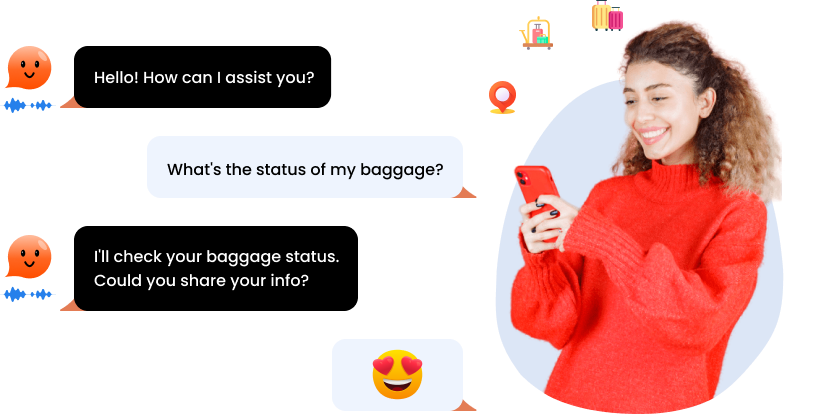
You can get real-time updates on the location and condition of your baggage through ChatGPT platform features. This may help improve the overall customer experience and lessen the risk of baggage being lost or delayed.
ChatGPT’s feature for performing Anomaly Detection, Parsing, and Summarization also makes it possible to automate the process of claiming a passenger’s lost baggage, which includes submitting claims and monitoring their progress. This can help increase the efficiency of the claims process while reducing airline employees’ work.
ChatGPT’s feature for performing Anomaly Detection, Parsing, and Summarization also makes it possible to automate the process of claiming a passenger’s lost baggage, which includes submitting claims and monitoring their progress. This can help increase the efficiency of the claims process while reducing airline employees’ work.
7. Safety Management
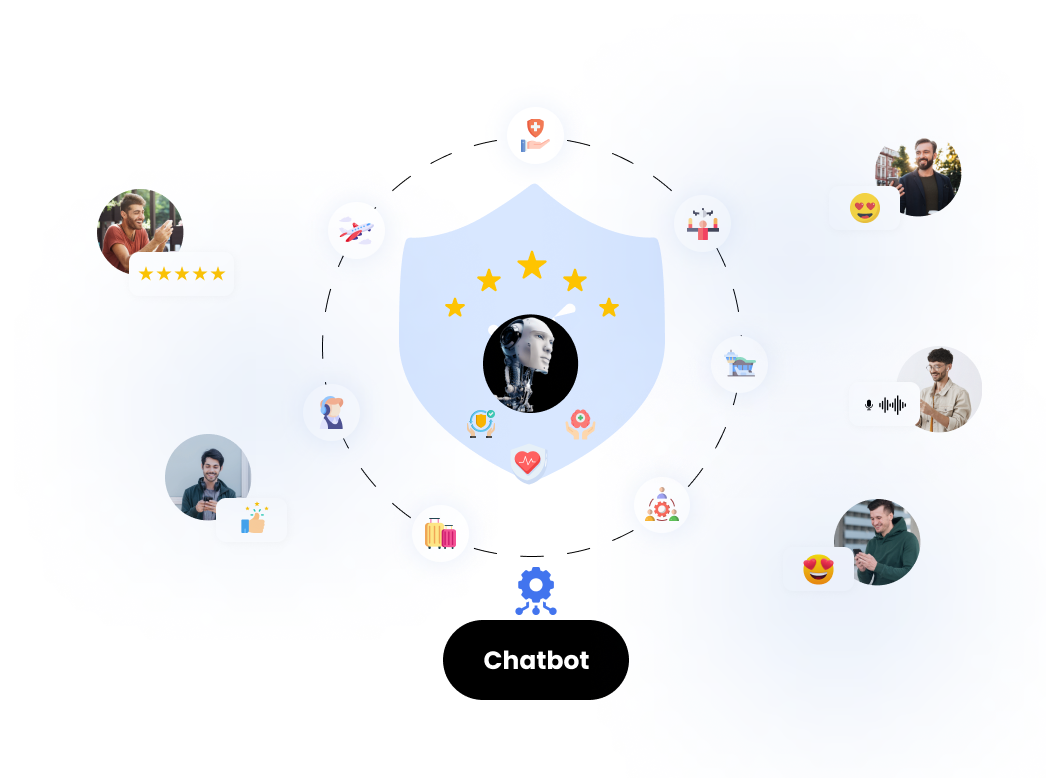
The reporting of safety incidents can also be streamlined with ChatGPT-based Bots, and the solution can be trained to provide instant feedback. This can allow for more timely and accurate safety reporting, which can reduce the occurrence of safety risks. The cutting-edge Predictive Analytics and Recommendation feature of the GPT platform can help examine safety data and spot potential problems. This can aid airlines in taking preventative measures to address safety concerns and enhance the security of their operations.
Pilots, flight attendants, and ground crew can all benefit from the ChatGPT-based Bots’ safety training capabilities provided using the Search and Generative AI functionality that it offers. For example, this capability can aid in making sure workers are aware of safety protocols and know how to respond in an emergency.
Pilots, flight attendants, and ground crew can all benefit from the ChatGPT-based Bots’ safety training capabilities provided using the Search and Generative AI functionality that it offers. For example, this capability can aid in making sure workers are aware of safety protocols and know how to respond in an emergency.
8. Crew Scheduling
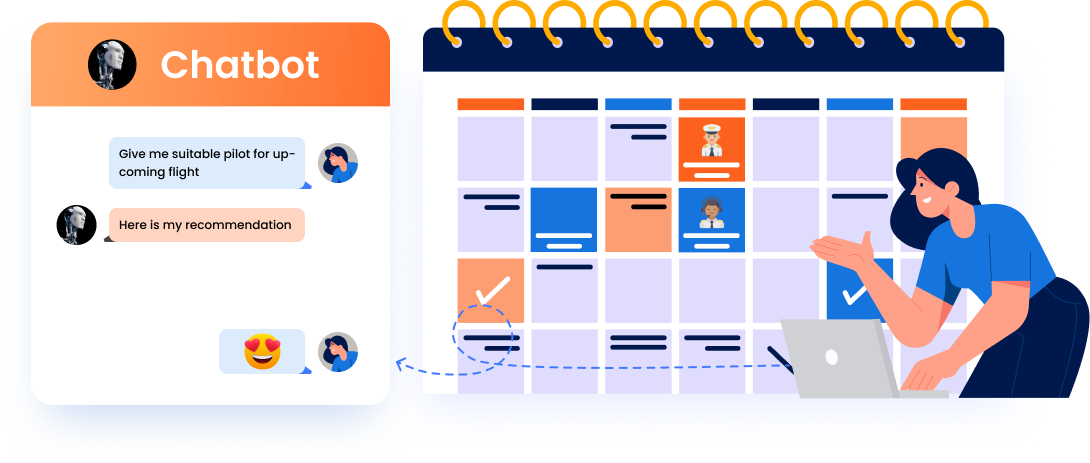
It is possible to use ChatGPT-based Bots to assist airlines in the scheduling and management of their crew members. The GPT-powered Bots can assist airlines in optimizing crew schedules and ensuring that flights are properly filled by conducting analyses of various characteristics, including skills, availability, and experience.
GPT technology, with the help of its features like Classification and Recommendations, can also assist in ensuring that shift swaps are fair and do not affect the overall schedule by examining variables, including availability, seniority, and workload. Further, crew members can receive real-time updates and notifications on schedule changes, flight delays, and other crucial information via GPT-based Bots. As a result, crew members are more likely to be informed of any changes that may impact their job and also are able to modify their plans as necessary.
GPT-based Bots can also evaluate each crew member’s capabilities, certifications, and preferences to pair them with flights complementary to their particular skills and interests. This can help improve productivity and the level of satisfaction experienced by customers by ensuring that the appropriate crew members are assigned to the appropriate flights.
GPT technology, with the help of its features like Classification and Recommendations, can also assist in ensuring that shift swaps are fair and do not affect the overall schedule by examining variables, including availability, seniority, and workload. Further, crew members can receive real-time updates and notifications on schedule changes, flight delays, and other crucial information via GPT-based Bots. As a result, crew members are more likely to be informed of any changes that may impact their job and also are able to modify their plans as necessary.
GPT-based Bots can also evaluate each crew member’s capabilities, certifications, and preferences to pair them with flights complementary to their particular skills and interests. This can help improve productivity and the level of satisfaction experienced by customers by ensuring that the appropriate crew members are assigned to the appropriate flights.
9. Flight Payments or Reimbursements
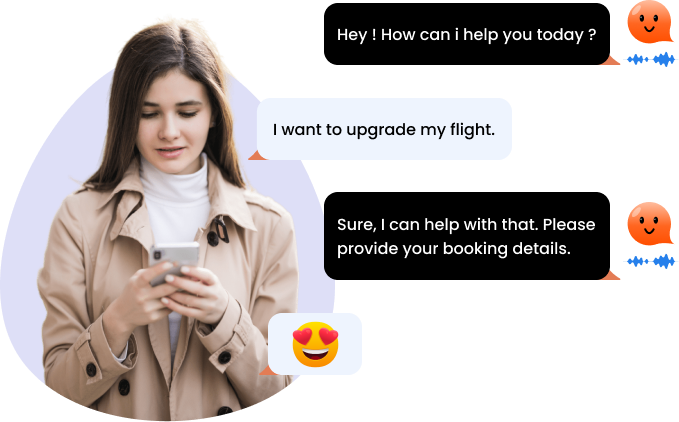
Flight upgrades, in-flight meals, and other services can be purchased using GPT-based Bots to process payments. As a result, the time and effort spent on processing payments can be streamlined. The Classification feature and Completion endpoint APIs of the GPT platform can be used to process client claims for refunds and reimbursements, such as those resulting from aircraft delays or cancellations.
Customers can get their billing questions answered, including those about billing inconsistencies and other payment processing concerns, using such Super Smart ChatGPT Bots. This can also ease pressure on support staff and positively impact customer satisfaction.
Customers can get their billing questions answered, including those about billing inconsistencies and other payment processing concerns, using such Super Smart ChatGPT Bots. This can also ease pressure on support staff and positively impact customer satisfaction.
10. Passenger Feedback
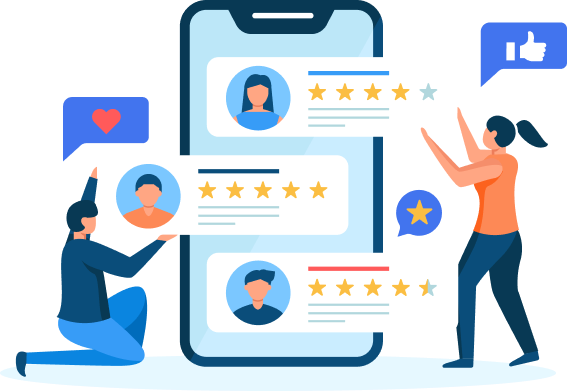
Using the Summarization, Fallback, and Text Generation capabilities of GPT-based Bots, airlines can respond to passenger input in a fast and tailored manner, resulting in happier customers and a better brand image. Airlines can immediately address any difficulties or concerns passengers voice thanks to GPT Platform’s real-time analysis capability.
In addition, airline companies may win back the trust of their customers and increase customer satisfaction by responding quickly to their comments and suggestions. Airlines can also save time and money with GPT-based Bots since they can process massive amounts of passenger feedback. This way, airlines can devote more time to other operations by automating the analysis and response to customer input.
In addition, airline companies may win back the trust of their customers and increase customer satisfaction by responding quickly to their comments and suggestions. Airlines can also save time and money with GPT-based Bots since they can process massive amounts of passenger feedback. This way, airlines can devote more time to other operations by automating the analysis and response to customer input.
An Interesting Point to Note
The ChatGPT Aviation Bots, in particular, have garnered attention due to their ability to capture inputs beyond just text. Along with text-based inputs, users can now use images, videos, and even their voice to communicate with the bot. This is possible thanks to the innovative multi-modal and speech-to-text capabilities of the GPT platform. With these new features, users can experience a more personalized and efficient communication process. The ChatGPT Aviation Bots are changing the game and revolutionizing the way people interact with chatbots.
Introducing Streebots for Aviation Industry and Airline Sector
A state-of-the-art solution powered by the latest in NLP and GPT technology. We’ve developed this solution to make the Aviation sector more secure and efficient!
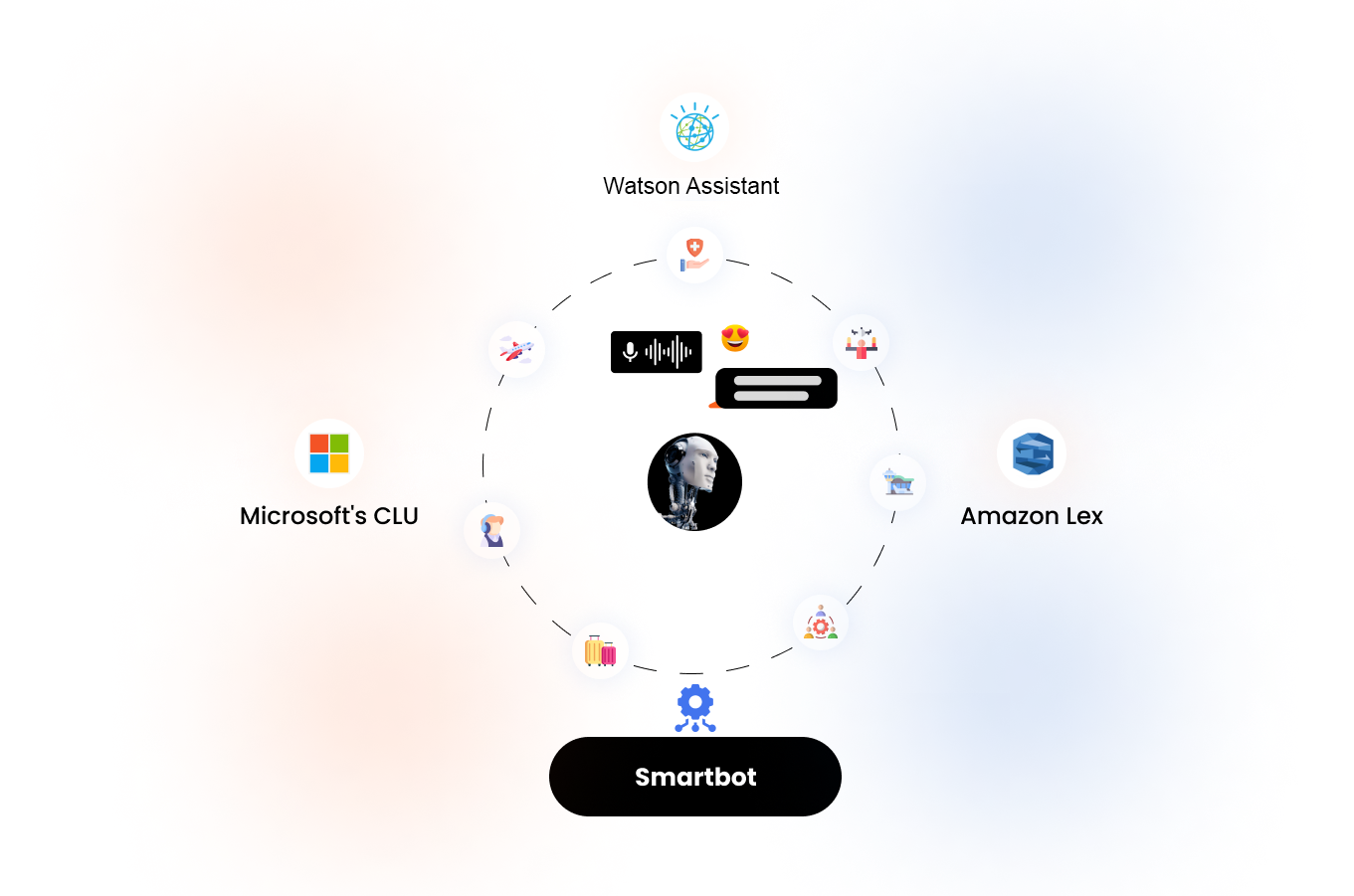
Streebo is revolutionizing the AI industry with its ChatGPT solution, designed specifically for companies and professional organizations in the Airline Industry. Using the latest GPT series language models and open.ai API technology, this innovative solution produces conversation prompts and responses that are eerily human-like, helping businesses to interact better with their customers virtually. This groundbreaking technology is powered by NLP engines from some of the world’s most renowned tech companies, including IBM Watson from IBM, Amazon Lex from AWS, Microsoft’s CLU, and Google Dialog from Google. Streebo’s Aviation Bots, which utilize this technology, are providing customized customer service that is unparalleled in the marketplace. With Streebo’s integration of its Bot Solutions with the latest GPT models, the sky is truly the limit when it comes to what businesses can achieve in terms of customer service innovation!
Streebo’s Aviation/Airline Bots can offer superior engagement and automation, resounding ROI, and guaranteed adoption.
Streebo’s Aviation/Airline Bots can offer superior engagement and automation, resounding ROI, and guaranteed adoption.
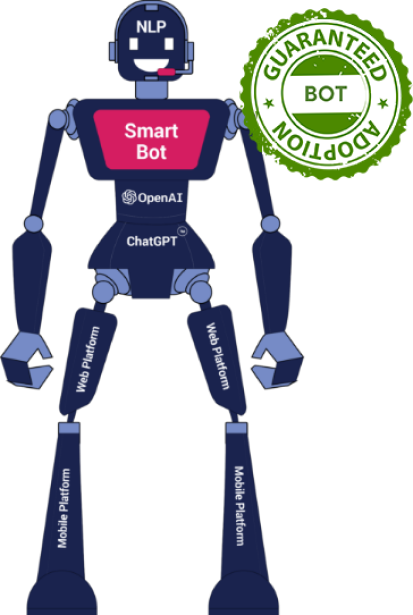
Some of the features include:
- Built-in domain intelligence
- Omnichannel experience on all platforms such as Facebook, WhatsApp, and Website
- Data security and compliance
- Advanced chat analytics
- Lower TCO
- Inbuilt live agent support
- Multi-lingual support
- Support of both Voice and Chat as well as
- Secured communication
- Context Switching Capabilities
- 99% Accuracy
- When it comes to data processing and security, there can be no compromises. Our Bots understand this and use only the best in the industry – IBM Watson, Google’s GCP, Amazon’s Lex, and Microsoft CLU, Copilot, Power Virtual Agents, to name a few. These branded NLPs provide unmatched peace of mind to enterprises that cannot afford any data breaches. But that’s not all – we go one step further by ensuring that all sensitive and other types of data are encrypted and masked using advanced algorithms. And with Open AI’s GPT Text Generation feature, there’s no need to worry about any manipulation, computation, or processing of business data. As a business owner, you can rest easy knowing that our Bots are the perfect ally to combat cybercrime and protect your sensitive information.
Clients that have deployed these Smart Bots are seeing

We guarantee to cut your current customer service costs in HALF!!
Final Food for Thought for Aviation Sector Leaders!
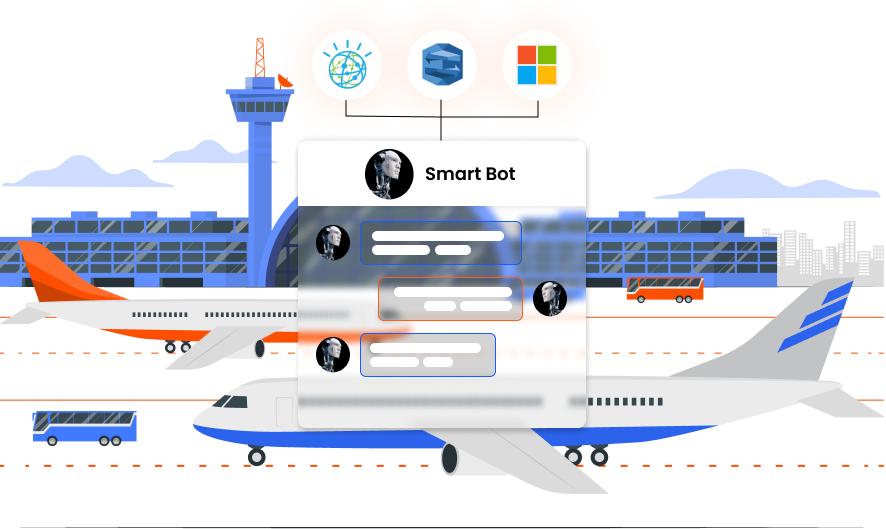
As the aviation industry continues to evolve, the role of technology in enhancing business profitability is becoming increasingly important. According to a report by Statista, the global Artificial Intelligence (AI) market size is expected to reach USD 309.6 billion by 2026, with the aviation industry being one of the key beneficiaries. By employing technologies like ChatGPT/GPT, airlines can improve the customer experience and operational efficiency, leading to increased business profitability. In a study by Deloitte, it was found that airlines that effectively implement AI and machine learning technologies can achieve up to a 45% reduction in maintenance costs, up to a 35% reduction in fuel consumption, and up to a 50% improvement in on-time performance. Furthermore, personalization can lead to a 10% increase in revenue, as per a report by Boston Consulting Group. By leveraging the power of AI and machine learning, aviation sector leaders can gain valuable insights into customer behavior, optimize operational processes, and enhance the overall customer experience, ultimately driving business profitability.
Streebo’s ChatGPT Aviation Bots are designed to provide airline companies with an unparalleled conversational AI experience, powered by the integration of Gartner leading Natural Language Processing (NLP) tools such as IBM Watson, Google Dialog, Microsoft CLU, Copilot, Power Virtual Agents, and Amazon Lex, along with the regenerative AI capabilities of the latest GPT platform. This innovative combination of technologies creates a truly remarkable solution for the aviation industry, offering customers an unmatched level of convenience and efficiency. Don’t miss out on the opportunity to experience this cutting-edge technology for yourself! Head over to our Aviation Bot Webpage today and drop us a note to schedule a personalized demo.
Streebo’s ChatGPT Aviation Bots are designed to provide airline companies with an unparalleled conversational AI experience, powered by the integration of Gartner leading Natural Language Processing (NLP) tools such as IBM Watson, Google Dialog, Microsoft CLU, Copilot, Power Virtual Agents, and Amazon Lex, along with the regenerative AI capabilities of the latest GPT platform. This innovative combination of technologies creates a truly remarkable solution for the aviation industry, offering customers an unmatched level of convenience and efficiency. Don’t miss out on the opportunity to experience this cutting-edge technology for yourself! Head over to our Aviation Bot Webpage today and drop us a note to schedule a personalized demo.
Disclaimer: ChatGPT and GPT are registered trademarks and terms fully owned by Open.AI. Author has used the term “ChatGPT for Aviation” to convey the idea of a ChatGPT kind of Bot, but for the Enterprise.




